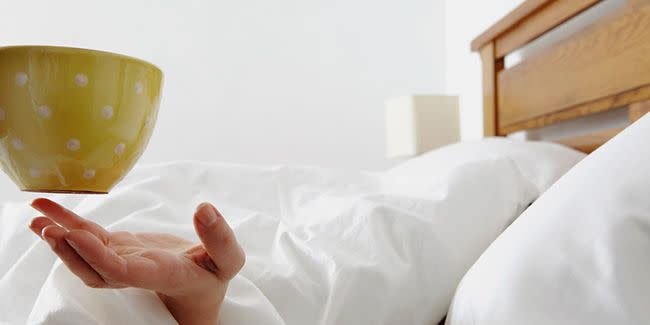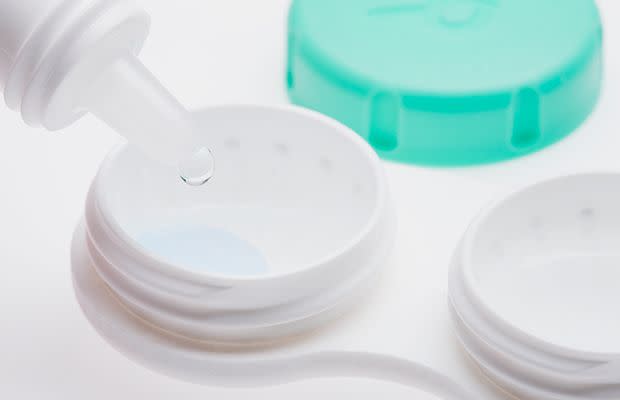10 Weird Things That Make Your Allergy Symptoms Worse

If you suffer from seasonal allergies, you probably try to avoid the triggers that turn you into an itchy, sniffling, sneezing mess. But even if you hibernate on high-pollen days, some of your everyday habits might be wreaking havoc on your well-being without you realizing it. Here are a few common culprits that could be making your symptoms worse. (Want to pick up some healthier habits? Sign up to get healthy living tips delivered straight to your inbox!)
1. Your veggie drawer

Some fruits and vegetables contain proteins similar to those found in pollen, which can confuse your immune system and lead to a reaction called oral allergy syndrome. For example, up to 75% of adults who suffer from hay fever experience itching or swelling in the mouth when eating apples or celery. Someone with a ragweed allergy may have a similar reaction to bananas or cantaloupe.
2. Your morning run
Pollen counts are typically highest before noon, so if you're planning an outdoor workout, consider waiting until later in the day. And make sure you kick off your running shoes and change out of your gear as soon as you get inside, especially if you've been running on trails or through pollen-heavy areas. "Taking a shower, washing your hair, and changing your clothes can be very helpful," says David J. Shulan, MD, a fellow of the American Academy of Allergy, Asthma, and Immunology.
MORE: 10 Exercises That Burn More Calories Than Running
3. Your duster

Keeping your house clean can help control allergens, but if you use a dry rag or feather duster, you may be spreading dust mites and dander around. "People think they're dusting, but the duster makes things fly up in the air," says Amber Luong, MD, PhD, an associate professor at the McGovern Medical School at the University of Texas Health Science Center in Houston. Use a damp cloth instead—it'll do a better job of trapping allergens.
4. Red wine
A glass might help you unwind, but it won't calm your allergies. Alcohol is a vasodilator, meaning it widens your blood vessels and can cause a runny, stuffy nose. "If you're having allergy symptoms already, alcohol will aggravate them," says Shulan. That's true for any booze, but wine packs an extra punch because it contains sulfites that may cause a reaction in some people. Red wine is typically highest in sulfites, and unlike white wine, it's fermented with the grape skins, which contain a protein allergen.
5. Skipping the gym
It's hard to get motivated when your face feels like it's about to explode, but a good workout can bring a bit of allergy relief. "It's basically like spraying Afrin in your nose," Luong says. "Because of the stress hormones you release when you're exercising, the blood vessels in your nose clamp down so you actually breathe better." It's a temporary effect, but at least you get a much-needed break from congestion—along with all the usual rewards of exercise. (Here's how to decide whether you should exercise when you're sick.)
6. Your contact lenses

Pollen and dust can stick to your contacts, trapping allergens against your already-itchy eyes. So if puffy eyes are making you miserable, consider switching to glasses or disposables on high-pollen days.
7. A dirty humidifier
The mist from a humidifier can bring sweet relief when you're feeling stuffy, but the reservoir can harbor mold and bacteria if you don't clean it regularly. "It's warm and wet—it's a setup for bacteria or fungus growth," Luong says. Following the manufacturer's cleaning instructions is a must.
MORE: 7 Reasons You're Tired All The Time
8. Swimming pools
Chlorine can dry out your skin and irritate your airways, which translates to intensifying allergy symptoms like itchy skin, coughing, and congestion. The good news is that your doctor can help you manage symptoms so you can keep swimming. "We don't tell our allergy patients to avoid the pool," Luong says.
MORE: 5 Signs You're Not Getting Enough Vitamin D
9. Skipping your morning coffee
Coffee won't relieve your allergies, but it might take the edge off some of your worst symptoms. Caffeine is similar to theophylline, a prescription drug used to control asthma; of course, the latter is more effective, but you still may feel a bit less stuffy after a strong cuppa. If your allergies tend to trigger migraines, caffeine can also relieve your head pain. And frequent coffee drinkers may experience withdrawal headaches when they skip a cup, which can make you feel extra crummy when you're already dealing with sinus pressure.
10. Decongestants
If you usually reach for a decongestant nasal spray to help you breathe easier, beware: "Decongestant [sprays] actually make your symptoms significantly worse if you use them longer than the 3 to 5 days that's recommended," says Luong. Beyond that time frame, they can cause a rebound effect that makes you feel more congested. Instead, Luong suggests combining a nasal steroid spray (to reduce swelling) with an antihistamine (to combat allergies). If you're stuffy all season, an allergist can help you find a long-term treatment plan.
You Might Also Like

